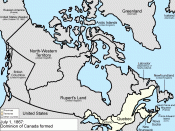A minority in Canada and North America, French Canadians have always feared integration. The perspective and the fear manifest itself in a view of Canadian history that is distinctly different from that of English Canadians. Francophones inside Quebec are a nation within Canada. They speak a different language and as a result, perceive the world differently from Anglophones and have always felt their culture is in danger of disappearing.
There are three distinct forms of Quebec nationalism that has dominated Quebec at different times. These include: the Canadian nationalism period of 1791-1840, the Ultramontane nationalism period of 1840-1960 and the Social-democratic nationalism of the last forty years. Essentially, "Quebec nationalism is the seeking, expression and conservation of a people's political, economic, and cultural life"(Clift 2).
It is paramount that Canadians who's objective is to keep Canada a unified country come to understand the different perspectives in the unity debate and to fully have an accurate depiction of the history of Quebec and its nationalistic endeavors.
Quebec nationalism has provided a coherent and palpable threat to Canadian federalism. It is easy for English Canadians to express many reasons why Quebec should not separate, but the threat imminently looms with Quecbecers. The more difficult task is to take a look at the other side of the debate.
The question has traditionally been what does Quebec want? Too often the answers seem to lean towards more powers for politicians. That answer, however, is incorrect because the powers are only ends. What Canadian citizens concerned about federalism must understand is what underlies the strategy of separatists and the perspective of Quebecers.
The perspective of French Canadians lies in two factors. The first being the French language and its preservation. The second being the French Canadian culture and its protection. This paper specifically outlines...



Copied
http://www.uni.ca/history.html
4 out of 4 people found this comment useful.